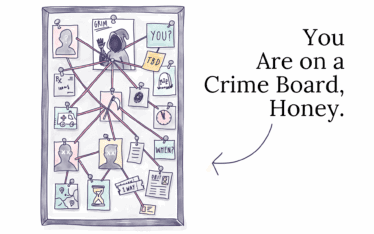Now that all that dry January nonsense is over, I can start talking about wine again without offending you. (If you abstained in January, I am over here raising a glass to you.) (If you abstain all year long, then I am cheers-ing you even more heartily.)
What’s the relationship between adversity and a good bottle of wine?
A) Woes and wine don’t age well together
B) It’s wise to keep barreling through hard times (get it? Barrels? Of wine? *Ba dum tss*)
C) When you’re in a pickle, it’s best to get pickled
There is no right answer; your results may vary. I choose C but my life choices might be questionable.
 The wine world offers a surprisingly apt metaphor for understanding how resilience works. (In case you missed the first day of Positive Psychology 101, resilience is the process of adapting well in the face of life’s shit sandwiches: adversities, traumas, tragedies, threats, stresses, snags, hangnails… the list of calamities goes on.)
The wine world offers a surprisingly apt metaphor for understanding how resilience works. (In case you missed the first day of Positive Psychology 101, resilience is the process of adapting well in the face of life’s shit sandwiches: adversities, traumas, tragedies, threats, stresses, snags, hangnails… the list of calamities goes on.)
Come with me on a vineyard field trip (wine tasting optional but *hiccup* encouraged) to explore how stress and struggle can lead to pretty great things in the bottle and in life…
Pissy Pinot Noir: Stress Breeds Excellence
Pinot noir—a.k.a. the “heartbreak grape”—is notoriously finicky and temperamental, requiring just the right combination of climate (sunny but cool), soil (dry and well-drained), and care (TLC, please) to produce a Wine-Spectator-worthy-wine. Ted Ross, the vintner from Hayseed + Houston in Paso Robles (who makes a killer pinot called Pray for Love) says, “Pinot Noir is like the extremely gifted but sullen kid in AP physics. One step sideways and they don’t even show up to take the final. When appropriately coaxed and stimulated, however, Pinot shines as if it’s in a class of its own.”
What makes this grumpy grape most remarkable is its masochistic relationship with stress. For pinot noir to reach its full potential, the vines must struggle. Crappy soil, limited water, and temperature fluctuations force the vine to channel its energy into the fruit, concentrating its flavor and complexity. Wait: bad conditions make for a better bottle?
This phenomenon mirrors the idea of eustress—a positive form of stress that challenges us without tipping us into the land of overload and crispy fried burnout. Like the pesky pinot grapevine under duress, we actually thrive when we’re exposed to manageable levels of adversity. Studies show that individuals who face moderate, controllable challenges tend to develop stronger coping mechanisms, greater problem-solving skills, and enhanced emotional resilience. Too little stress leads to stagnation; too much can overwhelm. It’s the right balance that fosters growth, Goldilocks.
Where are you on this handy Yerkes Dodson curve of peak performance? Do you need to reframe your relationship with stress, to appreciate that the right dose of it is actually optimal?

Pruning Like a Pro: The Role of Setbacks
Word on the street vineyard is that pruning is essential… I actually wrote about it here in 2021 which feels like several lifetimes ago. By cutting away excess foliage and unproductive shoots, the viticulturist (a.k.a. the “Wine Wizard”) directs the plant’s energy toward fewer, higher-quality grapes. Does it seem counterintuitive to inflict this kind of injury on the vine—vines that ain’t cheap? Yes, yes it does feel wrong. But it’s a necessary step in producing a superior harvest.
Obstacles and failures in life can act as a form of pruning. Research by psychologist Carol Dweck highlights how setbacks can be reframed as opportunities for growth, and that abilities and intelligence can be developed through effort and perseverance. Choosing a growth mindset amidst adversity builds character. Like the grapevine, if we seek out and endure strategic cuts, we can focus our energy on what truly matters.
What needs pruning in your life, even if it feels counterproductive to growth? Do you need to say no to a big opportunity that might be premature? Do you need to be doing less, to ultimately achieve more?
The Terroir of Adversity
In the wine world, terroir—a word that demands to be pronounced with a snooty French accent—plays a crucial role in shaping a wine’s character. Every vineyard imparts its own sense of place to the grapes through its unique combination of soil, climate, and geography. Poor soils often produce the most celebrated wines because they compel the vines to dig deep for nutrients, resulting in stronger roots and more flavorful fruit.
How does the concept of terroir translate to the environments and contexts that shape human resilience? Research by Emmy Werner found that kids from high-risk backgrounds could thrive if they had access to protective factors like supportive relationships, a sense of purpose, and opportunities to succeed. Just as a pinot noir’s roots strengthen when left no choice but to dig deep, we can develop resilience when we draw on internal and external resources to navigate challenging environments.
What would you consider your “resilience resources”? Who are the people you can call on for support when the going gets tough? Does physical activity help keep you sane when things are going sideways? Maybe meditation? Are you getting enough sleep? Might you need to start seeing your therapist again? Maybe a nice glass of red wine (kidding but not really)?
Fermentation: Transformation Through Struggle
The delightfully magical process of turning grape juice into wine offers us another juicy metaphor for resilience. Yeast gobbles up the sugar during fermentation and produces alcohol, heat, and carbon dioxide. It’s apparently a tumultuous affair, full of bubbling and transformation and annoying chemical equations. Yet it’s this very process that creates the wine’s complexity and depth.
In human terms, this fizzy phase represents the transformational power of adversity. Resilience research underscores the importance of meaning-making in overcoming challenges. Viktor Frankl—yes, the holocaust-surviving psychologist who wrote the incomparable “Man’s Search for Meaning“—argued that finding purpose in suffering is central to resilience. Like the fermentation process, our struggles can transform us… imparting newfound depth, wisdom, and strength.
Noble Rot: Sweetness From Grossness
I was inordinately excited to learn about the phenomena in wine production known as “noble rot,” and I hope you’re as dorkily jazzed as me. Under specific conditions, a fancy fungus—yes, you’re right, it IS botrytis cinerea!—affects grapes by concentrating their sugars and acids; what might initially seem like decay or destruction transforms the grapes into something extraordinary. Who knew that a nasty fungal infection could result in some of the world’s most sublime sweet wines?
Noble rot serves as a metaphor for finding unexpected blessings in hardship in life (no, I won’t be discussing the upside of your athlete’s foot—just go get that fungus fixed already). Challenges that initially appear as setbacks or losses can lead to profound growth and sweetness. Fired from your job? Maybe it caused you to reevaluate your ability/ inability to lead a team, and you hired a coach that helped you become So Much More Effective in your next leadership roles. Lost a loved one to Alzheimer’s? Maybe the grueling experience led you to a profound purpose to raise awareness and funds for the cause… a purpose you might not have known would be so fulfilling had you not been sadly exposed to it. Resilience involves not just surviving adversity but finding ways to alchemize it into something valuable. (Alchemy; sorry, we’re back to all that vexing chemistry.)
Is there a version of noble rot in your life right now? Decay doesn’t always turn into liquid gold but it’s worth considering where bittersweet growth might exist for you.
Blending Resilience: Community Matters
While single-varietal wines like pinot noir can stand alone, some of the world’s greatest wines are blends that combine multiple grapes to create a harmonious whole. (Bordeaux, par exemple, is a blend of Cabernet Sauvignon, Merlot, Petit Verdot, Malbec, and Cabernet Franc.) In the same vein, resilience is often a communal endeavor. Studies by social psychologists like Shelley Taylor emphasize the importance of social support in resilience. Strong relationships provide a safety net, offering encouragement, perspective, and practical help during tough times. (I was going to make a joke here about how it’s better to drink wine with friends rather than alone, but opted against it.)
Just as a winemaker carefully selects complementary grapes for a blend, we too can cultivate relationships that enhance our resilience. The people we surround ourselves with can amplify our strengths, mitigate our screw-ups, and help us navigate challenges with greater confidence, grace, and laughter.
Who do you want in your social blend? Have you been a bit too lone-wolf/ single-varietal lately? Might you benefit from relationships with a more diverse group of people to spend time with and learn from? Do you need to eradicate the friendships that are rotting, in a not-so-noble way?
Aging Gracefully: The Role of Time and Reflection
Okay so the wine has been fermented, so when can we drink it?! PATIENCE, MY THIRSTY FRIEND. The swill isn’t quite ready for consumption. The aging process—whether in oak barrels, steel tanks, or bottles—allows the wine to develop its full character, its je ne sais quoi (said in the same affected way as “terroir”, please). It’s during this painstaking time that tannins soften, flavors meld, and the wine matures into something freakishly fabulous.
Similarly, resilience is not an instantaneous trait; it’s cultivated over time through reflection and experience. Research shows that journaling, mindfulness, and other reflective practices help individuals process their experiences, extract lessons, and build resilience. Aging, whether in the barrel or in life, is a process of refinement that turns raw grape juice potential into intoxicating excellence.
Where do you need to be more patient in life… maybe more accepting of the time it will take to get promoted/ fall in love/ afford the pontoon boat/ feel fit again/ become the version of yourself you’ve always wanted to meet? Might you need a bit of self-compassion as you age in your barrel?
The Last Sip
The journey from grape to wine is one of struggle, transformation, and triumph (*cue epic movie ending music*). Some grapes don’t make the cut… as they say, “every box of raisins is a tragic tale of grapes that could have been wine.” It takes tenacity for a grape to make it to the bottle and not a red box of raisins. Just as a fine wine owes its character to the stresses it endured, so too do we owe our growth to the challenges we overcome (*outro music reaches dramatic crescendo*).

My friend Michael in Vienna said his brother made him this wine bottle. Now we all want one.
The next time you savor a glass of pinot noir (WANT TO COME JOIN ME WITH A GLASS TONIGHT?), take a moment to appreciate the story it tells—of doggedly determined roots that dug deep, vines that weathered storms/ drought/ any myriad of disasters sponsored by climate change, and fruit that transformed under pressure. Let it remind you that life’s stresses are shaping you into a damned fine vintage. You’re just getting better with age, babe.
Now let’s cheers to one hell of a resilient life, shall we?

P.S.: Why not pour a nice glass and read/ listen to my book, You Only Die Once: How to Make It to the End with No Regrets!
P.P.S.: Let’s do Instagram together!
P.P.P.S.: Oh and just in case you missed it… I’d love you forever if you took 16 minutes out of your life to watch my TEDx talk!






